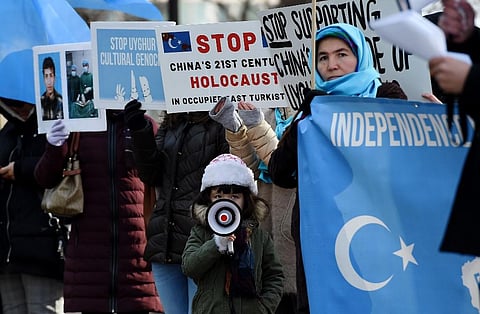

The Chinese Communist party is using social media influencers from troubled regions like Xinjiang, Tibet and Inner Mongolia to whitewash human rights abuses through an increasingly sophisticated propaganda campaign, a report has claimed.
The report published on Thursday by the Australian Strategic Policy Institute (ASPI), described the videos by “frontier influencers” as a growing part of Beijing’s “propaganda arsenal”, The Guardian reports.
The ASPI report points out that the Chinese Communist party (CCP) has long deployed covert and overt online information campaigns to portray positive narratives about its domestic policies, while also flooding the global public discourse with disinformation and propaganda.
But the potentially greater impact that influencers can have compared to party-state media or inauthentic social media activity is a point not lost on the CCP’s leadership, as well as on propaganda experts and scholars working inside the PRC.
According to a 2022 report by a research unit attached to China’s National Radio and Television Administration (NRTA), which is an executive agency under the CCP’s Central Propaganda Department, YouTube is ‘the main new media platform for the distribution of Chinese short videos overseas’, the report adds.
The report found that the cumulative fan number of the top 100 Chinese YouTube video accounts was 169 million. The accounts represent roughly four different types of entities: traditional state media outlets such as broadcasters and TV stations; online streaming services such as Tencent video and Youku; corporations and brands such as Huawei and Alibaba; and individuals and the agencies that represent them, said the report.
Accounts such as ‘Annie Guli’, which present the lives of ethnic minorities in China in a CCP-approved way, can be particularly useful in combating criticism from foreign governments, media and civil society. For example, the ‘Annie Guli’ account’s videos about cotton production in Xinjiang, which feature English-language subtitles, have been among its best performing on YouTube—something Chinese propaganda experts have made note of, the report said.
Further, according to the report, since the publication of data about coercive birth-control measures in Xinjiang, including anthropologist Adrian Zenz’s revelation in 2020 of a government campaign to suppress Uyghur birth rates by using sterilisations, IUDs and mandatory birth control,112 birth control has become a fraught topic, and one that MCNs have attempted to exploit.
In one of the videos on the ‘Hello Dina’ channel, for example, the vlogger gave the audience an insight into her relationship with her younger sister. As apolitical as the video seems, its title includes the question, ‘Do Xinjiang families have birth control?’—a non-sequitur response to international criticism of Xinjiang’s birth control policies.
The report recommends western platforms such as YouTube require mandatory declarations if creators are based in China or working for an MCN, and ban MCNs from profiting from advertising. Any accounts in breach of these requirements should be suspended, the report said.